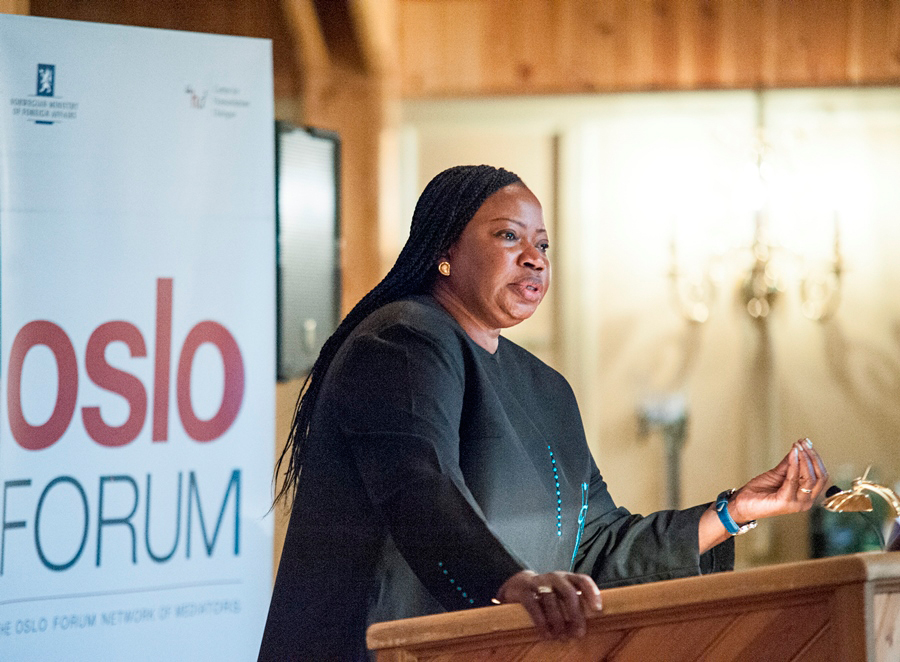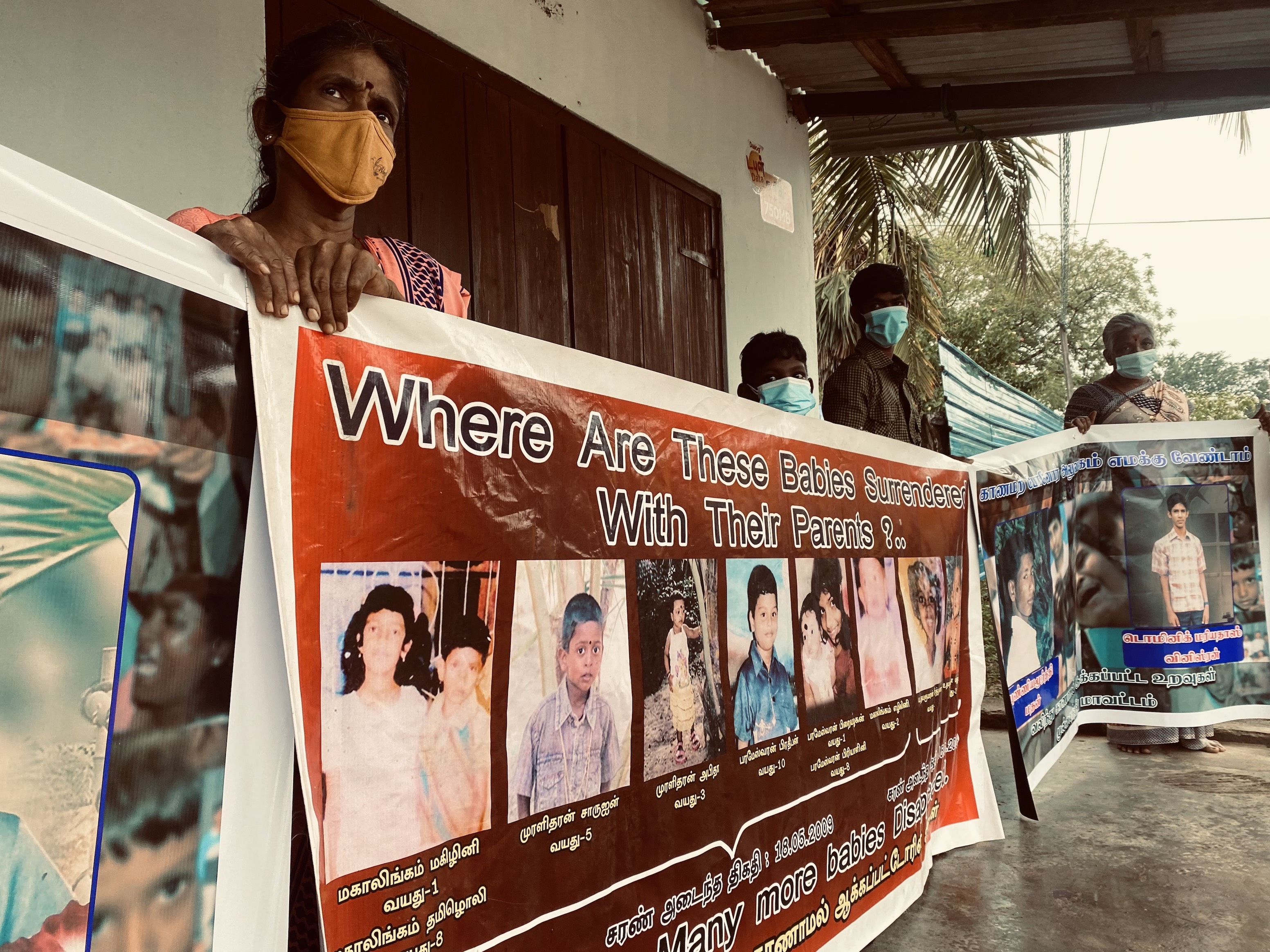A rally in Jaffna earlier this year where Tamils demanded Sri Lanka be referred to the International Criminal Court.
A landmark legal submission has been filed with the International Criminal Court (ICC) calling on the Chief Prosecutor to “investigate and in due course arrest” several senior Sri Lankan officials for crimes against humanity.
The submission, filed by Global Rights Compliance LLP on behalf of 200 Tamil victims in the United Kingdom, is being made under Article 15 of the Rome Statute, which allows the prosecutor to initiate investigations “on the basis of information on crimes within the jurisdiction of the Court”.
It names several senior Sri Lankan officials, including current president Gotabaya Rajapaksa, defence secretary Kamal Gunaratne, former army commander Jagath Jayasuriya and others as individuals “responsible for crimes against humanity of deportation (through underlying acts of abductions, unlawful detention and torture), deprivation of right to return and persecution”.
“The severity of the persecution they have faced left the Victims with no option but to flee Sri Lanka and seek refuge in the UK,” it continues.
“Subsequently, the Victims were and continue to be deprived of their right to return to their homes as a result of the threats, torture and persecutory policies of the [Sri Lanka] security forces led by Gotabaya Rajapaksa and Kamal Gunaratne... The Victims continue to suffer from the harassment of and threats to their loved ones who remain in Sri Lanka, as well as the ongoing surveillance, harassment and persecution directed towards themselves in the UK.”
That these crimes have been partly committed within the territory of the UK, which is a party to the ICC, allows Court to exercise territorial jurisdiction, states the submission.
The move marks the first time that such a submission has been made to the ICC, with lawyers also filing a similar submission has been made to the British Metropolitan Police’s War Crimes Team.
The Myanmar option
A referral to the ICC has been a core demand of Tamil victim-survivors for years, after the failure of the Sri Lankan state and other international justice initiatives in holding perpetrators for mass atrocities to account. However, the ICC has only opened investigations into a handful of cases around the world and with Sri Lanka not a party to the Rome Statute, it seemed difficult to envisage a path to have the court investigate crimes that have taken place on the island.
But moves in recent years to open an investigation into Myanmar, which also has not signed up to the ICC, shed light on another potential avenue.

Former Chief Prosecutor Fatou Bensouda
Former ICC Chief Prosecutor Fatou Bensouda said that since the end of 2017, her office had “received a number of communications and reports concerning crimes allegedly committed against the Rohingya population in Myanmar and their deportation to Bangladesh”.
“While Myanmar is not a State Party to the ICC, Bangladesh is,” said Bensouda. “The Court may therefore exercise jurisdiction over conduct to the extent it partly occurred on the territory of Bangladesh”. Following a request from the Prosecutor in July 2019, the ICC subsequently opened an “investigation into the situation in Bangladesh/Myanmar” later that year.
Lead submissions on behalf of the Rohingya Muslims in respect of the Bangladesh/ Myanmar case were done by Global Rights Compliance, and it is that same principle that the firm says applies to the case of Sri Lanka. They submit that the crimes of deportation, deprivation of the right to return and persecution have all partly taken place in the UK, “bringing it within the territorial jurisdiction of the Court”.
Their submission comes after a decision from a British tribunal earlier this year found that Tamils who engage in a range of political activities in the United Kingdom may continue to face “a real risk of ill-treatment or harm” if deported to Sri Lanka, in a significant ruling that clarified and expanded those who may face persecution on the island.
Read more: How a landmark British ruling may save Tamil activists from deportation to Sri Lanka
Read more: British tribunal recognises the risk of torture for Tamil political activists in Sri Lanka
The submission states there are three crimes in particular that it wants the Court to consider - deportation (through underlying acts of abductions, unlawful detention and torture), deprivation of right to return and persecution.
“Due to the abduction, unlawful detention and torture they have been subjected to at the hands of the GoSL authorities and to avoid being arrested again and put through the same, if not worse, treatment, the Victims decided to flee Sri Lanka,” states the submission. “The Victims had no genuine choice but to leave Sri Lanka as a result of the conduct of the GoSL authorities and the coercive environment that such conduct brought about.”
“The mental harm they suffered due to their abduction and torture in Sri Lanka has been exacerbated by their inability to return to their homes, families and communities, as well as the continuing threats against their family members,” it continues.
“The persecution of the Victims by the Sri Lankan authorities was carried through acts that themselves constitute crimes against humanity under Article 7 of the Statute, including enforced disappearance (i.e. abduction), imprisonment, torture and deprivation of right of return.”
The path to international justice
_8.jpeg)
More than 12 years have passed since Rajapaksa’s tenure as defence secretary, and he now sits as Sri Lanka’s head of state. No one has been held accountable for the military offensive that he oversaw, which results in hospitals shelled, widespread sexual violence and tens of thousands of Tamil civilians dead or disappeared.
To this day, Tamils around the world, in London and in the Tamil homeland are searching for answers and for justice.
 A rally in Mullaitivu earlier this month.
A rally in Mullaitivu earlier this month.
“Where are these babies [who] surrendered with their parents?” read a banner held by Tamil families last month, as they marked another year without their loved ones.
In the years since, several resolutions have been passed at the UN Human Rights Council, but none have led to any tangible outcomes.
“The criminal acts of the GoSL authorities have destroyed our lives,” said the victims in a joint statement.
“We all suffer from various mental illnesses (including post-traumatic stress disorder and depression) caused by our suffering at the hands of the GoSL authorities, the threats and harassment that our families are subjected to and being parted from our homelands and loved ones. The uncertainty that we had to go through during our respective asylum application processes in the United Kingdom, with the possibility of being handed over to our torturers in Sri Lanka, also took its toll on our mental health.”
“We live as shells of our former selves, unable to cope with the mental suffering that the GoSL has inflicted and continue to inflict on us every day.”
“This new initiative shows that there are some viable options to get international justice outside multilateral bodies such as UN Human Rights Council,” said one lawyer who worked closely on the submission. “Tamil victims around the world have been working for years towards justice and are determined that one day, it will be served.”
See a press release from GRC here.
See an executive summary of their submission here.
See the full submission here.
